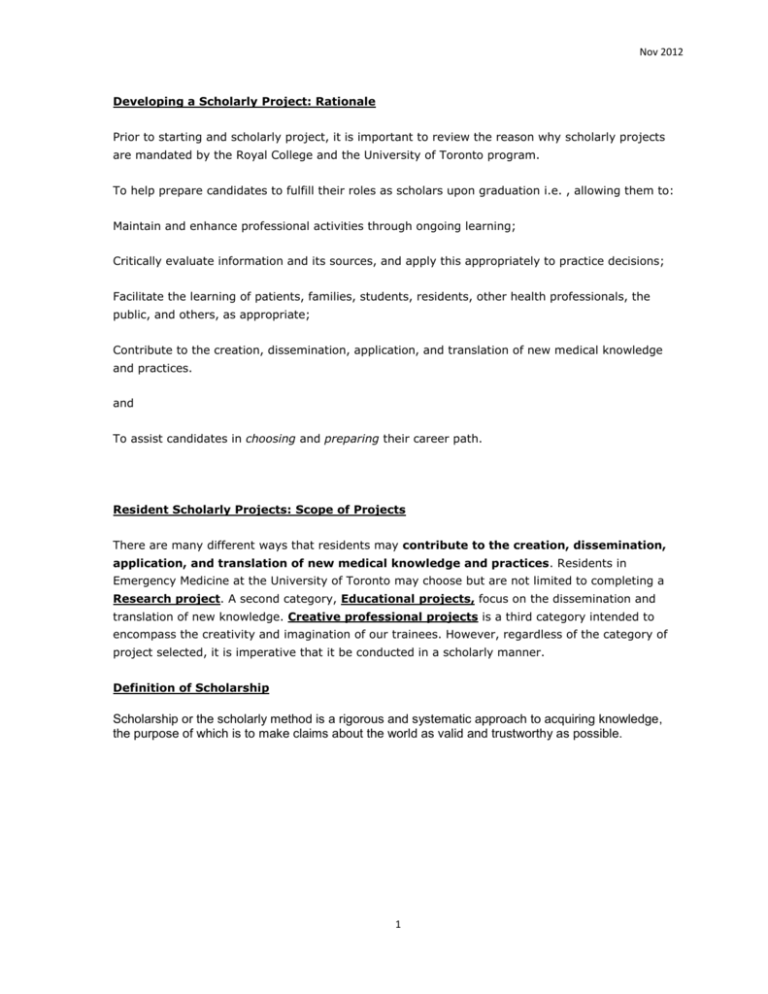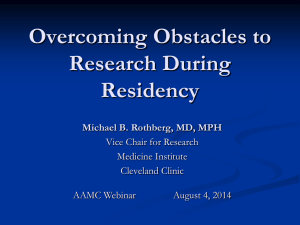Developing a Scholarly Project - Emergency Medicine
advertisement

Nov 2012 Developing a Scholarly Project: Rationale Prior to starting and scholarly project, it is important to review the reason why scholarly projects are mandated by the Royal College and the University of Toronto program. To help prepare candidates to fulfill their roles as scholars upon graduation i.e. , allowing them to: Maintain and enhance professional activities through ongoing learning; Critically evaluate information and its sources, and apply this appropriately to practice decisions; Facilitate the learning of patients, families, students, residents, other health professionals, the public, and others, as appropriate; Contribute to the creation, dissemination, application, and translation of new medical knowledge and practices. and To assist candidates in choosing and preparing their career path. Resident Scholarly Projects: Scope of Projects There are many different ways that residents may contribute to the creation, dissemination, application, and translation of new medical knowledge and practices. Residents in Emergency Medicine at the University of Toronto may choose but are not limited to completing a Research project. A second category, Educational projects, focus on the dissemination and translation of new knowledge. Creative professional projects is a third category intended to encompass the creativity and imagination of our trainees. However, regardless of the category of project selected, it is imperative that it be conducted in a scholarly manner. Definition of Scholarship Scholarship or the scholarly method is a rigorous and systematic approach to acquiring knowledge, the purpose of which is to make claims about the world as valid and trustworthy as possible. 1 Nov 2012 Expectations of Residents for Completion of an Academic Project All three types of projects require three steps A beginning, a middle and an end! Specifically: 1. Planning and formulation of the goals or objectives of the project. 2. Implementation of the project plan 3. Evaluation and Sharing of the project: where the goals and objectives achieved? Present your findings! Proposed Competencies for Scholarly Projects: The following guidelines include competencies that would normally be required to complete a scholarly research project. Note this is not intended as a mandatory checklist, but rather as a guideline to assist in the evaluation of scholarly projects. A resident normally will: 1. Complete a literature search – has the question, curriculum or creative activity already been addressed? (Scholar / Expert) 2. Complete the appropriate Research Ethics Board application, or determine that the project is exempt from REB review. A letter from the REB is often the best approach. (Professional) 3. Have made an original contribution to the conception, design, implementation or analysis of the project. This does not mean that residents are expected to create a completely novel project from scratch. In fact, Residents are encouraged to join pre-existing faculty run projects. However, the Faculty mentor and the Resident must clearly define what original contribution the resident will make. (Scholar) 4. Implement the project. (Expert) 5. Analyze and evaluate the project. (Expert) 6. Report the findings and conclusions of the projects at Resident Academic Day (Communicator). Proposed Mechanism for Evaluating Completion of Resident Projects In order to fairly evaluate a wide and diverse range of academic projects and to determine whether a project fulfils program requirements, the following mechanism is proposed: 1. Residents will define the objectives of a proposed project and plan for project implementation. 2 Nov 2012 2. The objectives and plan will be submitted for reviewed by the Program Director, Associate Director of Scholarship and the project mentor. At this time, a clear understanding of project expectations will be defined. 3. At any point the resident feels that have completed their project expectations outlined above, the Resident may submit their project for reviewed by the Program Director, Associate Director of Scholarship and the project mentor. Developing a Scholarly Project: Initial Steps Perhaps the most challenging part of developing an academic project is coming up with the question to be answered, for research projects, the knowledge or skill gap, for educational projects, or other type of need to be filled, for creative professional activity. In our day-to-day activities in the Emergency Department, we are constantly faced with clinical questions which have no good scientific answers and clinical practices which have no obvious justification other than tradition. Thus clinical practice is an excellent source of ideas for academic projects. However, A good researcher will take hold of one of these issues, however simple, and set out to address it. Some of the most elegant research results in a simple answer to a simple question or a new way of doing things nobody thought of before. Once you have identified a potential scholarly focus, the following steps will help to guide you in the right direction: (1) Formulate the Objective What exactly are you trying to accomplish? Thinks about a specific, measurable outcome. Imagine what the final results table of this project would look-like and work backwards. (2) Develop the Idea Further Start with a literature search Has the question already been asked? Has the question been answered well? A poorly-done study which does not answer the question in a scientific way begs for a proper study! Has the question been answered in your population? For instance, trauma studies in an inner-city U.S. population may not reflect the type of injuries seen in Toronto. (3) Find an Academic Supervisor 3 Nov 2012 This person should be from the Emergency Medicine faculty A List of potential Supervisors can be obtained from the Divisional office. Academic Supervisors will have several roles: Someone to review the idea with: Is it worth pursuing? Is the question well thought-out? Someone to help with the design of the study Most importantly, is the study too ambitious, can a resident feasibly complete it. A Supervisor should be supervising only one (at most two) resident projects at a given time. (4) Decide How Best to Answer the Question – Think about the ideal project design to answer your question. For example, when trying to compare the effectiveness of two different treatments, the randomized double-blind trial is the “gold standard”. But an RCT is not realistic for most resident projects! Once you know what the ideal project design would look like, break it down into small feasible steps. Ideally, each step would result in something tangible that would benefit your overall career goals. Example: A keen emergency resident wonders whether an IV ACE inhibitor can be used to rapidly lower after load resistance and improve the treatment of acute pulmonary edema. She decides that the ideal study design would be a double-blind RCT. She decides that her primary outcome should be the number of patients that require endotracheal intubation. Conducting an RCT is CLEARLY not feasible for a R-1 with lots of Emergency medicine to learn. She starts by conducting a systematic literature review of treatments targeting after load reduction in acute pulmonary edema. Her next phase will be to conduct a retrospective chart review to determine the number of patients presenting with acute pulmonary edema that require endotracheal intubation. In her third year, she plans to submit a grant application for a prospective pilot study to assess the feasibility of a studying acute pulmonary edema in the ED, while preparing the results of her chart review for presentation and Resident Academic Day. Having done most of the work already, she submits her abstract to the CAEP meeting, and uses feedback from her presentation at RAD to improve her presentation at CAEP! (5) Crunch the Numbers Determine how many patients/charts/etc. you need to answer the question; i.e., sample size calculation Your Supervisor can either help with this, or direct you (see, "Talk to The Experts", below) Remember to differentiate between statistical and clinical significance (6) Decide What Outside Resources You Will Need Budget 4 Nov 2012 Materials (even photocopying gets expensive!) Research Assistants for large studies Grants Find out deadlines early! Scholarly Activities Co-ordinator has lists of sources EMRTC for small amounts U of T Faculty of Medicine Research Office Phone: 978-6013 Internet: http://www.utoronto.ca/uoft.html (Research and International Relations section) Ethics For any project directly involving patients (7) Talk to the Experts Statistics Institute for Clinical and Evaluative Studies (ICES) at Sunnybrook, Research office at SMH Hospital Research Committees Grants Talk to staff who have them! Faculty of Medicine Research Office (see above) Ethics Try to review project with hospital ethicist or Centre for Bioethics at U of T Remember: Your Supervisor and the Scholarly Activities Co-Ordinator are available to help! You should not feel lost during this process. (Confused, bewildered, unsure....that's ok...but not lost!) Jacques S. Lee MD, MSc, FRCPC Associate Director, Scholarship Emergency Medicine Residency Training Program, University of Toronto 2075 Bayview Avenue, BG-04 Toronto, Ontario, M4N 3M5 (416) 480-6100, ext. 7701 5





